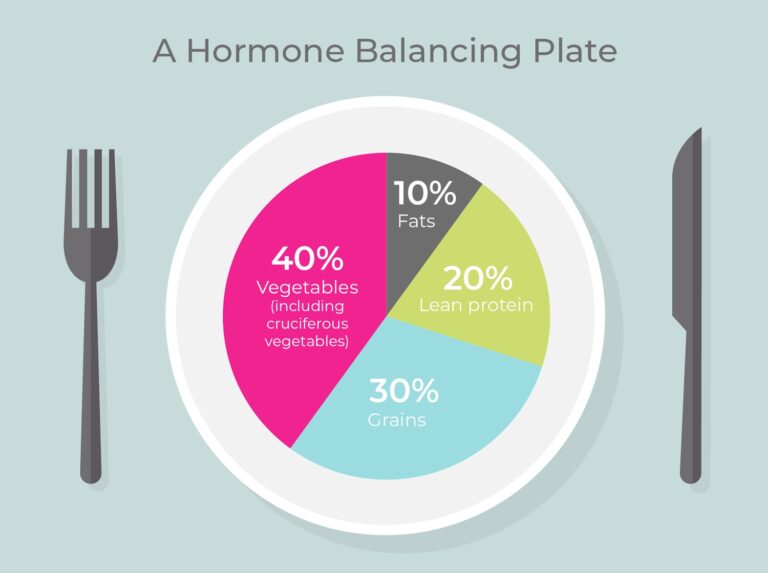If you’re in your 40s or 50s and feel like your body is no longer playing by the rules, you are not alone, and you are not imagining it. Unexplained weight gain, sudden hot flashes, mood swings, and constant fatigue can all be part of the natural life transition known as perimenopause and menopause.
Many women feel like they’ve lost control, and that the diet and exercise habits that once worked are now failing them. But there is a powerful truth: while the hormonal shifts are inevitable, suffering through the symptoms is not. Your plate is one of the most powerful tools you have to manage this transition.
This article is your practical, science-backed guide to understanding your body’s new needs and building a personalized nutrition plan to navigate this stage with strength and grace.
What’s Happening in Your Body?
To find the right solutions, we first need to understand the key changes happening inside your body during this time:
- Estrogen Decline: This key hormone plays a major role in regulating metabolism, maintaining bone density, and stabilizing mood. As it declines, your body has a greater tendency to store fat, particularly around the abdomen.
- Increased Insulin Resistance: Your body can become less sensitive to insulin, making blood sugar management a top priority to prevent cravings and further weight gain.
- Muscle Mass Loss: The natural age-related loss of muscle mass (sarcopenia) accelerates, which further slows down your metabolism.
Your 4-Pillar Nutritional Strategy for Menopause
The good news is that you can counteract these changes by focusing on a few key nutritional principles.
1. Make Protein Your Priority Protein is more important now than ever. Why?
- Preserves Muscle: It helps prevent the muscle loss that slows down your metabolism.
- Increases Satiety: It keeps you feeling fuller for longer, helping to control cravings.
- The Goal: Aim for 20-30 grams of high-quality protein with each meal (e.g., chicken, fish, eggs, legumes, tofu).
2. Embrace Fiber and Phytoestrogens
- Fiber: Crucial for gut health and stabilizing blood sugar (found in vegetables, fruits, and whole grains).
- Phytoestrogens: These plant-based compounds (found in flaxseed, soy, and chickpeas) have a structure similar to estrogen and can mildly help to buffer some symptoms, like hot flashes.
3. Focus on Calcium and Vitamin D With declining estrogen, the risk of osteoporosis increases. Ensuring adequate intake of calcium (from dairy, dark leafy greens) and Vitamin D (from sunlight, fortified foods) is essential for bone health.
 Also Read:
Gut Microbiome Protocols: Tracking Prebiotics and Probiot...
Also Read:
Gut Microbiome Protocols: Tracking Prebiotics and Probiot...
4. Hydrate Intelligently Drinking plenty of water can help reduce bloating and manage body temperature, which may lessen the intensity of hot flashes.

The Most Important Part: Finding Your Personal Triggers
The advice above is an excellent foundation, but the key to truly thriving lies in personalization. A specific food might be a major trigger for your hot flashes or mood swings. Common triggers include caffeine, alcohol, spicy foods, and high-sugar foods.
How can you become a detective for your own body? By tracking your data.
This is where Limotein becomes your personal investigative tool:
- The Method: For two weeks, use Limotein’s easy voice and photo logging to keep a detailed record of everything you eat and drink. At the same time, use a simple journal to note the timing and intensity of your symptoms (e.g., “2 PM: Hot flash, 7/10 intensity,” or “8 PM: Felt irritable”).
- The Powerful Insight: At the end of the two weeks, compare the two logs. Do you see a pattern? Do your hot flashes consistently happen after your morning coffee? Do you feel more anxious on days you eat more sugar? Limotein provides the objective, time-stamped food data you need to discover these vital connections.
Conclusion: This Isn’t an Ending, It’s a Powerful New Chapter
Menopause is a significant life transition. By equipping yourself with the right knowledge and a smart nutritional strategy, you can navigate this chapter with energy, grace, and a renewed sense of control.
Ready to manage this transition with more confidence? Start understanding your body’s new needs today. Use Limotein’s free trial to track your intake, identify your triggers, and build a personalized nutrition plan for this new chapter of your life.




